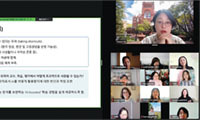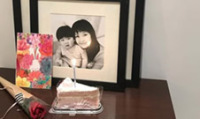▶ Joseph C. S. Yi
During the month of December, 2000, we had over four feet of snow in the Chicago area. Needless to say, we had less mobility for visiting friends and doing other things that are fun, meaningful and productive.
One thing that I did do was to catch up on some reading. For an old retired guy, I don? seem to have the time to read very much, something that I should do more of. One such book, a very small book, is titled "Don? Sweat the Small Stuff?nd It? All Small Stuff."
In the introduction section of the book, it states that man? greatest discovery is that human beings can alter his/her life by altering his/her attitude. The introduction goes on to say that we usually overreact, especially to adverse situations blowing things out of proportion thereby making it more difficult to resolve the problems.
The book goes on to say that there are two rules for living in harmony: #1, Don? sweat the small stuff and #2, It’s all small stuff.
We Asians know something about the Zen philosophy that says, when you learn to "let go" of problems, life begins to flow better. Most of us know the Serenity Prayer that suggests "Change the things that can be changed, accept those things that cannot be changed, and have the wisdom to know the difference. I think this is just another way of saying the same thing.
As you know, by now, one of my life? goals is to be helpful to people and situations. This little book provides many suggestions that do exactly that. So I thought I would share with you some of the thoughts that the author of this book, Dr. Richard Carlson, wrote about.
Let me acknowledge here that everything in this article, inside the quotation marks, are cited from his book titled ?on? Sweat the Small Stuff?nd It? All Small Stuff.
PRACTICE HUMILITY
"Bragging about yourself actually dilutes the positive feeling you receive from an accomplishment or something you are proud of. To make matters worse, the more you try to prove yourself to others, the more they will avoid you, talk behind your back about your insecure need to brag, and perhaps even resent you.
Ironically, however, the less you care about seeking approval, the more approval you seem to get.
Humility and inner peace go hand in hand. The less compelled you are to prove yourself to others, the easier it is to feel peace inside."
MAKE SERVICE AN INTERGRAL PART OF YOUR LIFE
"Several teachers and philosophers that I have learned from have suggested that I begin my day by asking myself the question, ?ow can I be of service? I have found this to be helpful in reminding me of the multitude of ways that I can be helpful.
When I take the time to ask this question, I find answers popping up all day long. If one of your goals is to be of help to others, you will find the appropriate ways. Your chances to be of service are endless.
The key, I believe, is to remember that being of service isn? a one-time effort. Instead, a life of service is a lifelong process, a way of thinking about life."
LET OTHERS HAVE THE GLORY
"Our need for excessive attention is that ego-centered part of us that says, ?ook at me; I? special; my story is more interesting than yours. To varying degree, most of us engage in this habit, much to our detriment.
Although it? a difficult habit to break, it? not only enjoyable but actually peaceful to have the quiet confidence to be able to surrender your need for attention, and instead, share in the joy of someone else? glory.
When you surrender your need to hog the glory, the attention you used to need from other people is replaced by a quiet inner confidence that is derived from letting others have it."
RESIST THE URGE TO CRITICIZE
"When we judge another person, it says nothing about that person; it merely says something about our own need to be critical.
Being critical solves nothing; rather it contributes to the anger and distrust in our world, and to the negative feelings of people to ourselves.
Criticism, like swearing, is actually nothing more than a bad habit. It isn? something we are proud to admit.
The solution is to catch yourself in the act of being critical. Try to remember to say, ?here I go again. Hopefully, more often than not, I can turn my criticism into tolerance and respect."
STOP BLAMING OTHERS
"When something doesn? meet our expectations, many of us operate with the assumption that, ?hen in doubt, it must be someone else? fault.
When we are in the habit of blaming others, more often than not, we will blame others for our own anger, frustrations, depressions, stress and unhappiness.
Surely there are times when other people and/or circumstances contribute to our problems, but it is we who must rise to the occasion and take responsibility for our own happiness.
Hold yourself accountable for your own happiness.
When you?e unhappy, remind yourself that only you can make yourself happy.
Blaming others will make you feel powerless over your life because your happiness is contingent on the action and behavior of others, which you cannot control. When you stop blaming others, you will regain your sense of personal power. You will see yourself as the choice maker."
LIVE THIS DAY AS IF IT WERE YOUR LAST
"The truth is, none of us has any idea of how long we have left to live. Sadly, however, we act as if we? going to live forever.
We postpone the things that, deep down, we know we want to do telling people we love how much we care, visiting a good friend, writing a heartfelt letter, learning to meditate, becoming a better listener, and on and on. We come up with elaborate and sophisticated rationale to justify spending most of our time and energy doing things that aren? that important.
I felt it appropriate to end this book by suggesting that you live each day as if it were your last on this earth. I suggest this not as a prescription to abandon your responsibilities, but to remind you of how precious, and short, life really is.
Finally, please don? forget the most basic strategy of all, DON? SWEAT THE SMALL STUFF.
EPILOGUE
The book contains 100 such ways to keep little things from taking over our lives; I have cited just 6 of the stories. Other stories, all equally helpful, are titled Make Peace With Imperfection, Develop Your Compassion, Do Something Nice For Someone Else, Become More Patient, Seek First to Understand, Think of What You Have, Instead of What You Want, Do Someone A Favor and Don? Expect One In Return, Fill Your Life With Love, Give Up the Idea that More Is Better, Keep Asking Yourself, ?hat? Really Important, etc.
I have cited 3 or 4 paragraphs from each of the stories I have selected to share with you. If you want a fuller text of each story, I would suggest that you buy the book; it is a good investment.
I write these monthly articles for one purpose; to be helpful to the members of our Korean American Community, to achieve a more meaning and productive life. I hope this article was helpful.
Joseph Yi came to America in 1940, at the age of 10, and has lived basically in the Chicago Metropolitan Area. Although Mr. Yi’s professional life was in the mainstream society, he has actively participated in the voluntary social services for the Chicago Korean community.
스마터리빙
more [ 건강]
[ 건강]이제 혈관 건강도 챙기자!
[현대해운]우리 눈에 보이지 않기 때문에 혈관 건강을 챙기는 것은 결코 쉽지 않은데요. 여러분은 혈관 건강을 유지하기 위해 어떤 노력을 하시나요?
 [ 건강]
[ 건강]내 몸이 건강해지는 과일궁합
 [ 라이프]
[ 라이프]벌레야 물럿거라! 천연 해충제 만들기
 [ 건강]
[ 건강]혈압 낮추는데 좋은 식품
[현대해운]혈관 건강은 주로 노화가 진행되면서 지켜야 할 문제라고 인식되어 왔습니다. 최근 생활 패턴과 식생활의 변화로 혈관의 노화 진행이 빨라지고
사람·사람들
more많이 본 기사
- 남가주 전역에 ‘물폭탄’… 성탄 연휴 ‘대혼란’
- [2025년 한 해 ‘진 별’들] 미주 한인사회 원로들 ‘역사의 뒤안길’로
- 체포 불체자 수만명 물류창고에 수감 추진
- 여성 살해·자녀 납치 한인 ‘수배’
- 한인타운 한복판 주유소서 강도 ‘칼부림’
- 크리스마스 연휴 음주운전 ‘꼼짝마’
- 우크라이나도 “Merry Christmas!”… 지구촌 성탄 축하
- “소변 불편한데 주저하다 방광 망가져”
- ‘라스베가스에서 만난 한인들’
- 새해 더 건강해지기 위한 의사의 과학적 조언 10가지
- 서태지, 딸·엘리와 1년 만에 근황 “좋은 소식 없어 안타까워”
- CBS가 보류한 ‘불법체류자 추방’ 보도, 캐나다서 원본 유출
- “대학 학자금 상환 안하면 임금 압류한다”
- 난방기 뜯자 ‘비밀공간’ 은신 마피아 보스 체포
- 선우용여 “아들, 돈 없어 개밥 먹기도..아파트 마련해줬다”
- 최준희, 엄마 故최진실 생일 맞아 추억 “우리 마미 축하”
- H-1B ‘10만 달러 수수료’ 연방법원, 이의소송 기각
- 북한인, 아마존 위장취업 대거 적발
- 테슬라, “비상사태 시 차문 안 열려”
- 중산층이 집을 사지 않는다?… 챗GPT가 내다본 주택시장 미래
- 피클볼이 바꾸는 부동산의 얼굴
- 서유리, ♥법조계 남친 데이트 신청에 두근.. “돈은 내가 낸다”
- 한국외대·연세대·한양대 GCEO 연합골프대회 성황
- [스티브 강 ‘인사이드 미국’] 2026 중간선거: 트럼프 지지율 하락이 말해주는 것
- [유혜미 칼럼] 치솟는 환율, 경제 지표의 역설
- 바야흐로 ‘귀금속 시대’… 금·은·구리까지 사상 최고
- 원·달러 환율, 당국 개입에 42원 폭락
- 여성 살해·자녀 납치 한인 ‘수배’
- 팔레스타인서 구금된 한인 여성 무사 귀환
- 국방부 “中, 美 안보 위협할 군사력 보유…본토 갈수록 취약”
- LA 마약조직 집중 단속 갱단원 등 수백명 체포
- 트럼프 ‘전쟁할 결심’?… 미군 특수부대 카리브해 이동
- [성탄절 앞둔 우울한 경제상황] ‘내 코가 석자’… 기부 급감
- 오헌, 샌디에고 떠나 피츠버그와 입단 합의… 송성문에겐 기회
- 뚜레쥬르, 뉴욕시 맨해튼 매장 오픈
- “평신도 시각에서 본 선교 준비 실제와 영적 묵상”
- 조지아 역주행 사고, 한인 남편 이어 임신 아내·태아 사망
- 백악관, 군에 “베네수엘라 원유 격리하라” 총력 지시
- ‘16kg 감량’ 홍현희, 다이어트 비결 뭐길래..날렵해진 턱 라인
- 트럼프, 李대통령에 ‘백악관 황금열쇠’ 선물… “최고의 협력관계”
- 우크라, 20개항 종전안 최신판 공개…영토 할양은 ‘미해결’
- [기고] 안정의 기준은 어떻게 제도가 되었나
- [윌셔에서] 우리 안의 ‘생각하는 사람’을 깨울 시간
- [만화경] 해수부 부산시대
- “소방관 노고에 진심으로 감사해요”
- 한인들 위한 무료 법률 상담회 개최
- ‘시민 리더십 아카데미’ 신청 접수
- “온 세상에 평화를⋯”
- 산타 한반도 다녀가셨네…성탄절 밤하늘 제주-서울 돌고 평양행
- 다운타운 LA 라이브에 등장한 아이스링크
1/5지식톡

-
 미 육군 사관학교 West Poin…
0
미 육군 사관학교 West Poin…
0https://youtu.be/SxD8cEhNV6Q연락처:wpkapca@gmail.comJohn Choi: 714-716-6414West Point 합격증을 받으셨나요?미 육군사관학교 West Point 학부모 모…
-
 ☝️해외에서도 가능한 한국어 선생님…
0
☝️해외에서도 가능한 한국어 선생님…
0이 영상 하나면 충분합니다!♥️상담신청문의♥️☝️ 문의 폭주로 '선착순 상담'만 진행합니다.☎️ : 02-6213-9094✨카카오톡ID : @GOODEDU77 (@골뱅이 꼭 붙여주셔야합니다…
-
 테슬라 자동차 시트커버 장착
0
테슬라 자동차 시트커버 장착
0테슬라 시트커버, 사놓고 아직 못 씌우셨죠?장착이 생각보다 쉽지 않습니다.20년 경력 전문가에게 맡기세요 — 깔끔하고 딱 맞게 장착해드립니다!장착비용:앞좌석: $40뒷좌석: $60앞·뒷좌석 …
-
 식당용 부탄가스
0
식당용 부탄가스
0식당용 부탄가스 홀세일 합니다 로스앤젤레스 다운타운 픽업 가능 안녕 하세요?강아지 & 고양이 모든 애완동물 / 반려동물 식품 & 모든 애완동물/반려동물 관련 제품들 전문적으로 홀세일/취급하는 회사 입니다 100% …
-
 ACSL 국제 컴퓨터 과학 대회, …
0
ACSL 국제 컴퓨터 과학 대회, …
0웹사이트 : www.eduspot.co.kr 카카오톡 상담하기 : https://pf.kakao.com/_BEQWxb블로그 : https://blog.naver.com/eduspotmain안녕하세요, 에듀스팟입니다…
케이타운 1번가
오피니언
 스티브 강 전 한인민주당협회 회장
스티브 강 전 한인민주당협회 회장 [스티브 강 ‘인사이드 미국’] 2026 중간선거: 트럼프 지지율 하락이 말해주는 것
 김홍일 케이유니콘인베스트먼트 대표
김홍일 케이유니콘인베스트먼트 대표 [기고] 안정의 기준은 어떻게 제도가 되었나
 유혜미 한양대 경제금융대학 교수
유혜미 한양대 경제금융대학 교수 [유혜미 칼럼] 치솟는 환율, 경제 지표의 역설
 성민희 소설·수필가
성민희 소설·수필가 [윌셔에서] 우리 안의 ‘생각하는 사람’을 깨울 시간
 김정곤 / 서울경제 논설위원
김정곤 / 서울경제 논설위원 [만화경] 해수부 부산시대

[왈가 왈부] 내란재판부·정통망법 또 수정… 졸속·땜질 아닌가요
 정숙희 논설위원
정숙희 논설위원온라인쇼핑과 반품, 그리고 그 이후
 파리드 자카리아 / 워싱턴포스트 칼럼니스트 / CNN ‘GPS’ 호스트
파리드 자카리아 / 워싱턴포스트 칼럼니스트 / CNN ‘GPS’ 호스트 트럼프의 새 독트린 “미국을 다시 왜소하게”
 김동찬 시민참여센터 대표
김동찬 시민참여센터 대표 [미국은 지금] MAGA의 분열, 예견된 균열의 시작
1/3지사별 뉴스

“온 세상에 평화를⋯”
숨가쁘게 달려온 2025년을 이제 1주일 남짓 남긴 채 크리스마스 이브를 맞는다. 다사다난했던 한 해를 되돌아보며 마무리하는 연말 시즌과 크리…
H-1B비자 고임금·경력자에 우선권

‘올해는 ICE 이민자 체포 광풍의 해’
올 한해동안 버지니아와 메릴랜드, DC 등에서 연방 이민당국에 체포된 사람이 1만명이 훌쩍 넘는 것으로 조사됐다. 또 미 전국적으로는 22만명…
“ATM기 사용하기 겁나네”

한인들 위한 무료 법률 상담회 개최
샌프란시스코 베이지역 한인회(회장 김한일)는 지난 20일 한인회관에서 북가주 지역 한인들을 위한 무료 법률 상담회를 개최했다. 이날 행사에는 …
여성 살해·자녀 납치 한인 ‘수배’

오늘 하루 이 창 열지 않음 닫기 





















































.png)


댓글 안에 당신의 성숙함도 담아 주세요.
'오늘의 한마디'는 기사에 대하여 자신의 생각을 말하고 남의 생각을 들으며 서로 다양한 의견을 나누는 공간입니다. 그러나 간혹 불건전한 내용을 올리시는 분들이 계셔서 건전한 인터넷문화 정착을 위해 아래와 같은 운영원칙을 적용합니다.
자체 모니터링을 통해 아래에 해당하는 내용이 포함된 댓글이 발견되면 예고없이 삭제 조치를 하겠습니다.
불건전한 댓글을 올리거나, 이름에 비속어 및 상대방의 불쾌감을 주는 단어를 사용, 유명인 또는 특정 일반인을 사칭하는 경우 이용에 대한 차단 제재를 받을 수 있습니다. 차단될 경우, 일주일간 댓글을 달수 없게 됩니다.
명예훼손, 개인정보 유출, 욕설 등 법률에 위반되는 댓글은 관계 법령에 의거 민형사상 처벌을 받을 수 있으니 이용에 주의를 부탁드립니다.
Close
x